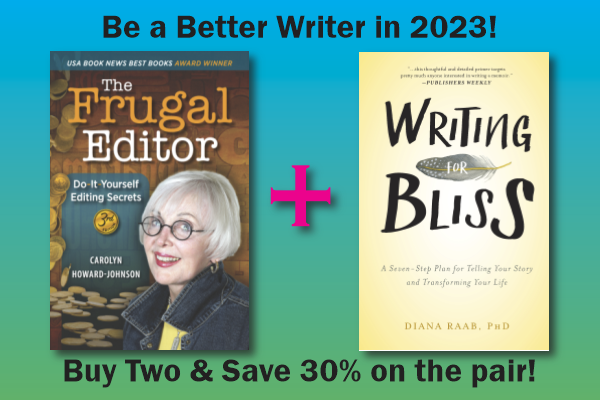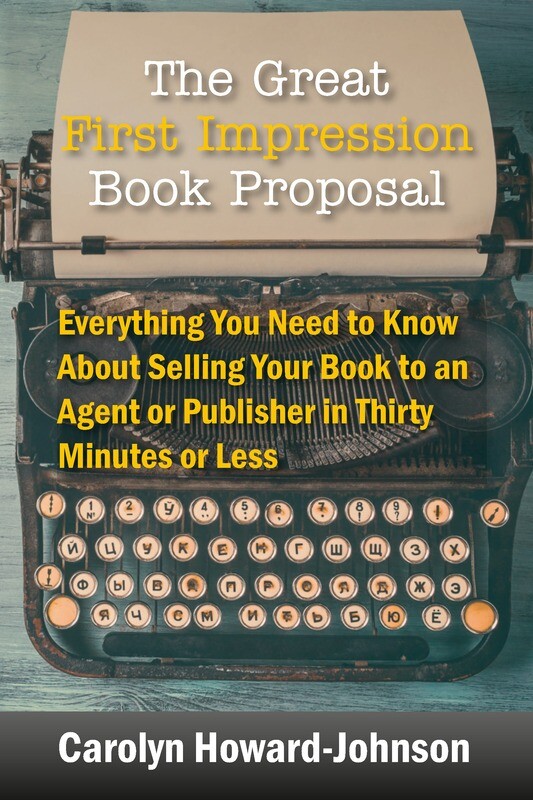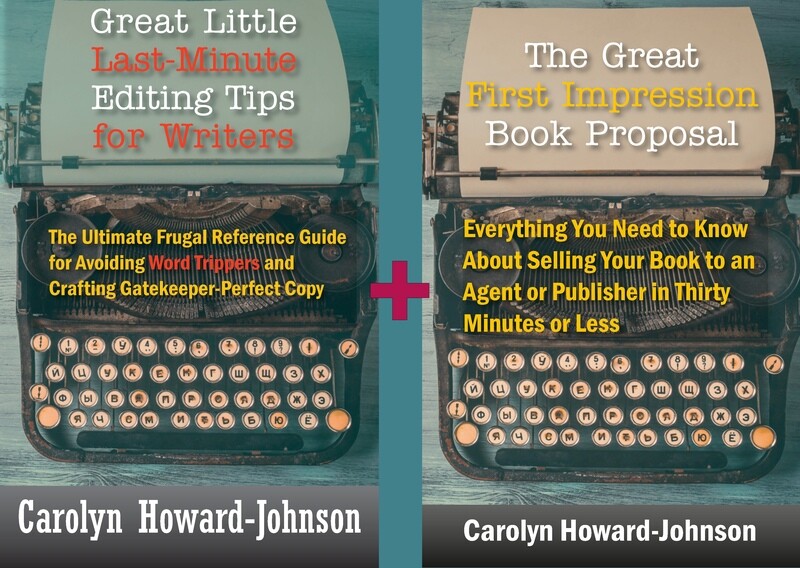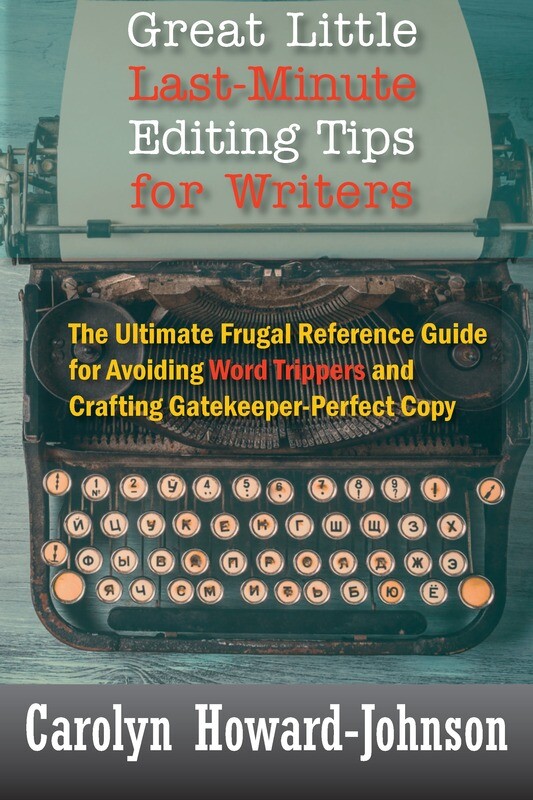By Carolyn Howard-Johnson, author of the multi award-winning HowToDoItFrugally series of books for writers
“Even with a style guide, there are no hard and fast rules in the English language. There are multiple versions of style guides, and the rules for common situations can vary from guide to guide. None of the major style guides are exactly the same, which raises plenty of questions and leads to many a linguistic debate. No one seems to agree on what’s correct, but that’s only because each style guide applies to a different situation — and none of them are wrong.” ~WordGenius.com

Carolyn Howard-Johnson
First impressions are important. We all are aware of that as we brush our teeth and try to unknot the rat’s nests from the back of our hair each morning. In fact, first impressions are part of our marketing efforts, too. Whether we authors are trying to get an interview or a TV appearance or marketing our books using e-mail or social networks, editing is an essential part of that first-impression effort. Generally that first effort is a query letter or proposal. Thus editing equals great first impression. That makes it an integral part of a marketing campaign.
Here are a scattering of helps gleaned from my HowToDoItFrugally Series of books (www.howtodoitfrugally.com) but especially my fun booklet, Great Little Last Minute Editing Tips for Writers (http://bit.ly/LastMinuteEditsII), and Great First Impression Book Proposal (http://bit.ly/BookProposalsII, both in their second editions and recently released by Modern History Press. My multi award-winning The Frugal Editor is coming this fall from in its third edition from Modern History Press.
Five Editing Myths Waiting to Trip Up Your Campaign to Market Your Work
- If your English teacher told you something is OK, it is.
(Nope. Language rules and style guidelines have changed since you were a sophomore.) - If a manuscript or query is grammar-perfect, you’ll make a great first impression.
(No! Lots of things that are grammatically correct will annoy publishers, agents, and other gatekeepers like feature editors.) - Always use your Spell and Grammar Checker.
(Maybe. Some well-known editors suggest you don’t use it at all, but The Frugal Editor gives you dozens of ways to make it your partner instead of your enemy.) - Your publisher will assign a top-flight editor so you don’t need to worry about your manuscript.
(Maybe, but don’t count on it. Besides you can be a better partner for an editor—whether she is assigned to you by your editor or you hire one for yourself– if you know something about the process; you’ll know better when to nix her suggestions! In any case, I suggest hiring an editor of your own before you submit your manuscript and you’ll love my Great Little Last-Minute Editing Tips (bit.ly/LastMinuteEditsII) for building the confidence you need to say no an editor no matter how professional she is. - Typesetters and editors will take care of the hyphens, ellipses, and all the other grungy little punctuation marks that English teachers avoided teaching because they didn’t know how to use them either.
(Chances are, you’ll catch even great formatters and editors in an error or two if you know your stuff!)
Here’s one last suggestion for fiction writers ’cause they’re so often neglected when it comes to marketing.
Avoid using italics for internal thought in the synopses sections of your marketing tools or in the sample chapters you must include. Italics are being used more and more these days, but using them often becomes a crutch that enables writers to avoid writing great transitions and point-of-view. The best agents and publishers will recognize it as such.
—–
Carolyn Howard-Johnson, an award-winning author of both fiction and nonfiction, a former publicist for a New York PR firm and was an instructor for the renowned UCLA Extension Writers’ Program for nearly a decade. She is an editor with years of publishing and editing experience including national magazines, newspapers, and her own poetry and fiction. Learn more about the author at http://HowToDoItFrugally.com .Her The Frugal Book Promoter: How to Do What Your Publisher Won’t (http://bit.ly/FrugalBookPromoIII) won USA Book News’ best professional book award and the Irwin Award. The Frugal Editor: Put Your Best Book Forward to Avoid Humiliation and Ensure Success (http://bit.ly/FrugalEditor) is top publishing book for USA Book News and Reader Views Literary Award. The Great First Impression Book Proposal: Everything You Need To Know To Sell Your Book in 30 Minutes or Less is a helpful little booklet available at http://bit.ly/BookProposalsII is now in its second edition from Modern History Press. And don’t miss another booklet Great Little Last-Minute Editing Tips for Writers: The Ultimate Frugal Booklet for Avoiding Word Trippers and Crafting Gatekeeper-Perfect Copy, http://bit.ly/LastMinuteEditsII, also from Modern History Press.
Carolyn Howard-Johnson

![The Frugal Editor, 3rd [PB] The Frugal Editor, 3rd [PB]](https://d2j6dbq0eux0bg.cloudfront.net/images/11280610/3305548491.jpg)








![The Frugal Book Promoter - 3rd Ed [PB] The Frugal Book Promoter - 3rd Ed [PB]](https://d2j6dbq0eux0bg.cloudfront.net/images/11280610/1132581773.jpg)
Thank you for having me share with your peeps, MHP! It is an example of a “10 Tips” model that print media loves because they can use one tip at a time that helps them fill up odd corners of space in their layouts. The third edition of Frugal Book Promoter includes an example of these promotional tools in the appendix and tells more about how to use them in the body of the book.
Good essay as usual Carolyn. As you say, every expert disagrees on the details. I like italics for quoted thoughts because this is a signpost to the reader, and you can never have too many of them. Other than that, I agree with all your points.
Have fun!
Bob